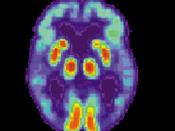DEMENTIA
Dementia diseases, such as Alzheimer's disease (AD), have a large impact on the everyday life of persons affected, their spouses, and the staff involved in their daily living (Borell, 1992). For example, the cognitive dysfunctions resulting from dementia diseases interfere largely with the performance of most activities of daily living (ADL) (Bäckman, 1992). Consequently, an urgent need exists to develop programs supporting everyday occupation for persons with dementia. Occupational therapy can help persons with a dementia disease to regain and retain meaningful life skills (Rogers, 1986). Yet few such programs are documented; and few attempts have been made to evaluate the effects of such programs on the performance of ADL among individuals exhibiting dementia. Furthermore, it is unclear what the focus of such programs should be. Should the intervention seek to improve the cognitive constituents underlying performance of ADL (e.g., memory), or should it focus on environmental and social conditions supporting task performance (Fisher, 1992)?
Several attempts have been made to enhance cognitive functions, like memory, in persons with dementia diseases (Bäckman, 1990).
However, training-related gains have been small or nonexistent following these interventions (e.g., Bäckman, Josephsson, Herlitz, Stigsdotter, & Viitanen, 1991; Beck et al, 1985; Zarit, Zarit, & Reever, 1982). It is conceivable that the lack of effects of these techniques in training persons with dementia diseases is due to the reliance on effortful strategies and associative skills (e.g., imagery, organization) that are severely impaired in dementia (Bäckman et al., 1991; Josephsson et al., 1993). Thus, persons with dementia may lack the requisite cognitive skills for making effective use of this type of training. Other functions relevant to ADL performance, like motor functioning and procedural memory, are less affected in dementia diseases (Dick, Kean, & Sands, 1988). Procedural memory has been defined as the presence of previous...


